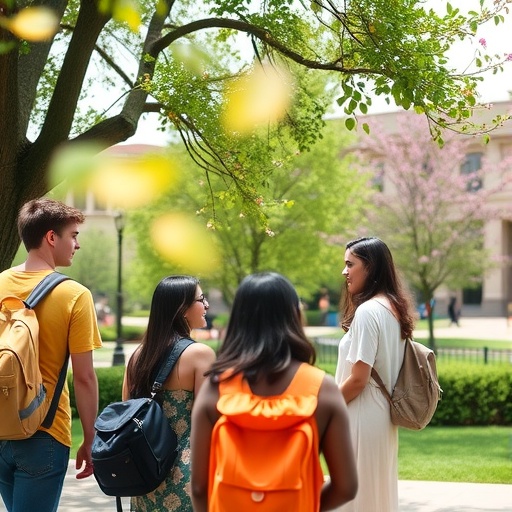In early adulthood, individuals often encounter profound life changes that reshape their behaviors and worldviews. Among these pivotal moments, starting university stands out as a unique transition that may trigger shifts in lifestyle, including the adoption of pro-environmental behaviors. Recent research spearheaded by scholars in the United Kingdom has uncovered compelling evidence suggesting that these significant life events provide a fertile ground for encouraging sustainable habits, with targeted interventions during this period potentially yielding long-lasting environmental benefits.
The study, published in the peer-reviewed journal PLOS Climate, elaborates on how crucial turning points can reorder personal priorities and catalyze behavioral transformations. The researchers utilized a multifaceted approach to examine how entering higher education influences young adults’ engagement with environmentally responsible actions, such as choosing active travel methods like biking and walking, and reducing meat consumption. These behaviors contribute substantially to reducing one’s carbon footprint and promoting ecological sustainability.
Importantly, this shift toward greener habits is often amplified during transitional phases when longstanding routines are disrupted. The psychological concept of “moments of change” emerges as an essential framework in understanding behavior modification. These moments effectively interrupt habitual actions, creating a window during which new social norms and personal values can be adopted more readily. The transition into university life exemplifies such a moment, where young adults face a novel environment accompanied by fresh social influences and commitments.
Within this context, active travel assumes a pivotal role, serving not only as a mode of transportation but also as a visible commitment to environmental stewardship. Walking and biking represent low-carbon alternatives to motorized transport, and their uptake can significantly reduce urban pollution levels and greenhouse gas emissions. The research highlights that university newcomers are particularly receptive to adopting these sustainable travel modes, making early adulthood a strategic point for intervention.
The reduction in meat consumption emerged as another significant behavioral change associated with the university transition. Meat production accounts for a sizable portion of global greenhouse gas emissions, land use, and water consumption, hence dietary shifts carry tangible environmental implications. Young adults often become more conscious of dietary choices during this period due to increased exposure to new information and peer influence, which can foster a more plant-based diet aligned with pro-environmental ethics.
From a methodological standpoint, the research was supported by the European Research Council’s grant focused on understanding and leveraging ‘moments of change’ for pro-environmental behavior shifts. The interdisciplinary team employed a combination of longitudinal surveys, interviews, and social network analysis to elucidate how transitions impact behavioral intention and implementation. This comprehensive approach enabled a nuanced characterization of how early adulthood milestones can function as catalysts for sustainable lifestyle adoption.
Critically, this research underscores the importance of timing in environmental interventions. Rather than implementing generic campaigns targeting broad populations, directing resources toward those undergoing major life transitions could amplify the effectiveness and durability of behavior change. Universities and policymakers are encouraged to integrate sustainability initiatives into orientation programs and campus culture to capitalize on this window of opportunity.
Furthermore, the findings imply that environmental behaviors adopted during early adulthood have the potential to persist and even proliferate through social contagion mechanisms. As young adults establish social networks imbued with sustainability values, these behaviors can diffuse more broadly within communities, generating a cascading effect that enhances collective environmental impact.
This study also opens avenues for exploring how technology can support interventions during these transition periods. Digital platforms and apps that promote sustainable choices tailored to the specific needs and contexts of new university students could enhance engagement and provide continuous reinforcement of pro-environmental habits.
Importantly, the research team noted that while moments of change offer significant promise, sustaining behavioral modifications requires supportive environments that reduce barriers and embed sustainability as a normative expectation. This highlights the role of institutional frameworks, urban design, and social incentives in maintaining and scaling environmentally responsible actions among young adults.
In sum, the intersection of life transitions and environmental behavior change presents a powerful nexus for advancing global sustainability efforts. Beginning university is more than an academic milestone—it is a critical juncture where attitudes and behaviors towards the environment can solidify for a lifetime. By harnessing this moment through evidence-based policy and community engagement, societies can foster resilient, environmentally conscious generations prepared to confront the challenges of climate change.
This focus on young adults at transitional life stages represents an innovative paradigm in sustainability science, bridging psychological theory, sociological insights, and practical intervention design. With climate urgency escalating, such targeted approaches offer hope not just for incremental improvements but for systemic shifts in societal behavior patterns at scale.
Subject of Research: Pro-environmental behavior change during significant life transitions, especially at the onset of university life.
Article Title: Shifting horizons: Significant life events and pro-environmental behaviour change in early adulthood
News Publication Date: 15-Oct-2025
Web References: http://dx.doi.org/10.1371/journal.pclm.0000709
Image Credits: Photo by Haydon on Unsplash. Free to use under the Unsplash License
Keywords: pro-environmental behavior, life transitions, early adulthood, sustainable habits, active travel, meat consumption reduction, behavior change interventions, moments of change, climate action, sustainability, young adults




